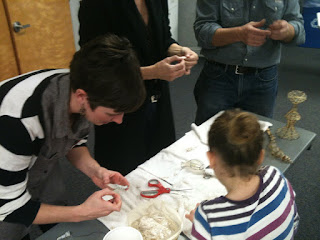
Materials: Hard & Soft is a competition and exhibition held at the Greater Denton Arts Council building. Hundreds of entries are judged and $500 cash is awarded to the winners. The exhibit runs through April 5. Photo by Zac Switzer/Staff Photographer
H. Drew Blackburn
Senior Staff Writer
@hdrewblackburn
Senior Staff Writer
@hdrewblackburn
The 26th annual Materials: Hard & Soft exhibition went underway Saturday at the Meadows Gallery in theGreater Denton Arts Council building located at 400 E Hickory St.
The exhibition focuses on artwork made of both hard and soft materials, such as wood, fabrics and glass.
Executive Director of the Greater Denton Arts Council Margaret Chalfant said that there were more than 568 entries from 37 states entered in the exhibition.
This year’s juror Jean W. McLaughlin selected 71 artists.
“I was delighted by the strength of the work in this show,” McLaughlin said. “The pieces are accomplished, fresh, sensitive, diverse, some controlled and more traditional, others freely using processes to push ideas forward.”
McLaughlin has been the executive director of the Penland School of Crafts since 1998.
“The jurors are selected because of their accomplishments in the art world and are nationally known, which makes each year unique and different because the different tastes and submissions from the country,” Chalfant said.
As the juror, McLaughlin chose the artworks exhibited in the gallery and she chose ten “juror awards,” each worth a $500 prize.
Chalfant said that the exhibit costs the Greater Denton Arts Council $10,000 – $12,000 a year, and is funded by memberships, grants and sponsorships.
Chalfant said they’ve already had 110 people come in.
Some of the viewers come from other parts of the country like Bobbie and Jack Kennedy of Winterset, Iowa.
They said they come to Denton to visit friends but also the exhibition every year.
”We’re just intrigued by the show,” Bobbie Kennedy said. “We like to judge whether the right people got the juror awards.”
The exhibit ends on April 5.









































